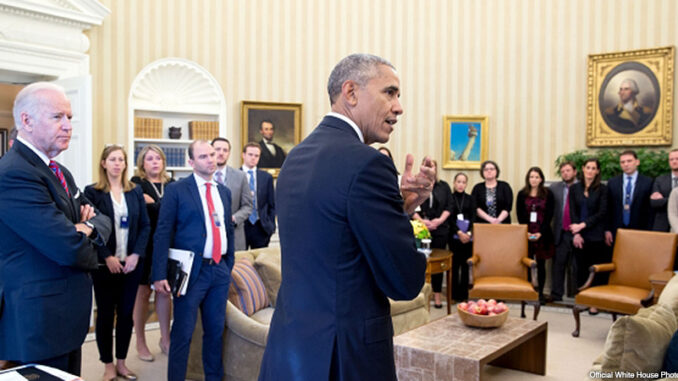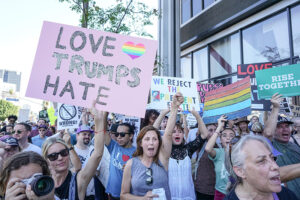
Protests Rock U.S. Cities
In the wake of last Tuesday’s presidential election, protests have occurred around the United States as thousands of people voice their anger about the election results. Throughout the country, protesters have expressed their outrage with Donald Trump’s stand on women, minorities, immigrants, and Muslims during his campaign.

Outside Trump Tower in New York City this week, thousands of protesters blocked off streets in busy midtown Manhattan and chanted. Many of the organizers of the protest were too young to vote, but nevertheless wanted to make sure their voices were heard. In Los Angeles, at least thirteen people were arrested last Wednesday night after protesters torched a giant Trump effigy and brought traffic to a standstill. Five more were arrested in Chicago during the course of the protests there. And in Portland, a small group of protesters blocked traffic, delayed trains, burned American flags, and assaulted a Trump supporter with a skateboard. Other protests have occurred in Philadelphia, Boston, Washington, D.C., St. Paul, and many other cities across the United States.
Most of the protests have been peaceful. Many university leaders have also led their own form of quiet protest: by postponing classes and tests, and by providing “safe spaces” for students who are angry with, or feel threatened by, the outcome of the election.
Clinton supporters are not the only ones reacting strongly to Trump’s victory. Since Election Day, there has been a rise in anti-Muslim hate crimes. There have also been many nationwide reports of violence and/or aggression against women, African-Americans, immigrants, and the LGBTQ+ community. Racist graffiti has appeared in many U.S. cities, and the KKK is planning a parade in North Carolina in support of the election results.
What Do You Think? Do you believe that people should have the right to express their anger with the outcome of an election by staging peaceful protests, or do you believe it is the job of citizens to support their president (or president-elect) no matter what? Be sure to give reasons to support your position. What, in your opinion, should frustrated citizens do – other than protest – to make their feelings heard?
World Reactions
World leaders have had a wide variety of reactions to Donald Trump’s impending presidency. Close to home, both Mexico and Canada reaffirmed their friendship with the United States, though Mexican Foreign Minister Claudia Ruiz Massieu reiterated that Mexico would not pay for the wall that Trump has proposed building along the U.S.’s southern border. Leaders of the United Nations and NATO reminded Trump of the U.S..’s important role in–and responsibility to–these organizations. And many European leaders (such as French President Francois Hollande) congratulated Trump but expressed concern about his values and priorities.
Other global leaders–such as Prime Minister Viktor Orban of Hungary, Prime Minister Benjamin Netanyahu of Israel, and Prime Minister Najib Razak of Malaysia–declared Trump’s win a victory for all Americans. On the other hand, many Middle Eastern leaders, especially those in Syria, worried that Trump’s anti-Muslim statements will lead to aggressive policies in the Middle East and destroy the possibility of Syrian refugees being able to seek asylum in the United States. In the aftermath of the election, Japanese Prime Minister Shinzo Abe worked to calm his country and assure them that he would do everything possible to work with President-elect Trump, despite the negative statements Trump made about Japan while campaigning.
Throughout the campaign, the relationship between Trump and Russian president Vladimir Putin was closely watched by Americans. After Trump’s win was declared, Putin sent a telegram congratulating Trump and said he looked forward to a chance to working with him and improving relations between the U.S. and Russia.
Dig Deeper Who are the United States’ traditional allies? Identify them on a map. Based on what you have heard and seen in the news, do you think our relationship with those countries will improve or decline under Trump’s administration? Why? Be sure to give reasons to support your answer.
What Now for Democrats?
Throughout the campaign season, Republican leaders’ unwillingness to support their candidate for president seemed to point to a serious rift within the party. However, in the wake of Donald Trump’s surprising victory, and Republican victories in the House and Senate, it is the Democrats who are left reeling, wondering what is next for their party.
Republicans now control the White House and both houses of Congress. More than likely, Trump will soon appoint a conservative Supreme Court justice, breaking the current 4-4 tie. Republicans also control at least 34 state governorships–the most since 1922. Many of the most prominent Democrats, such as Bernie Sanders and Elizabeth Warren, as well as Hillary Clinton herself, are aging, and many new, younger Democrats are still largely untested. Moreover, with so few Democratic governors in place, there are fewer options to draw upon for future leadership.
The main strategy of the party at this point will be to oppose Trump in Congress. Hillary Clinton seemed to allude to this kind of resistance in her concession speech, when she encouraged her followers to continue defending equal rights for all Americans. This may mean using filibuster or other techniques to block future legislation backed by the Trump administration. However, the more progressive wing of the party–Warren and Sanders, for example–is already looking for common ground with President-elect Trump, as they share the support of working-class voters. (While Clinton is viewed as representing the establishment, or the “status quo,” both Warren and Sanders, like Trump, have been viewed as potential agents for change.) They, along with their fellow progressive Democrats, believe that the Democratic Party has drifted out of touch from its voters and needs to find ways to better address the concerns of working-class people. This division between “establishment” Democrats and “change” Democrats is a rift that the party will need to bridge before it can move forward.
Still, Democrats have won the popular vote in six of the past seven presidential elections. And it is likely that this trend will continue, as the American electorate becomes more and more diverse each year.

